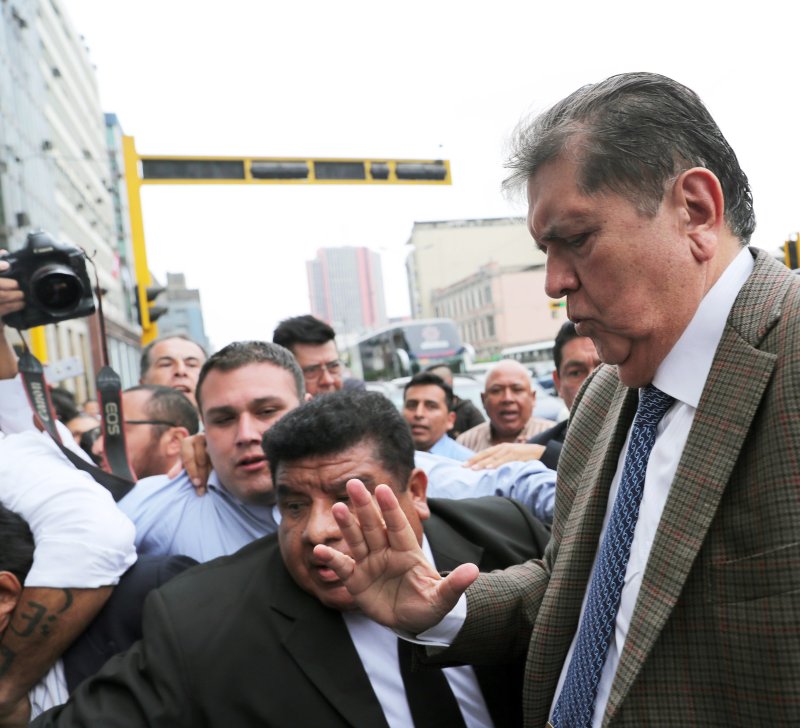Former Peruvian President Alan Garcia arrives at the headquarters of the Public Prosecutor's Office in Lima, Peru, on Thursday. Three days later he sought asylum in the Embassy of Uruguay. Photo by Ernesto Arias/EPA-EFE
Nov. 19 (UPI) -- Peruvian President Martin Vizcarra said Monday he's asked his Uruguayan counterpart, Tabare Vasquez, to honor past agreements to fight international corruption and reject asylum for Lima's former leader.
"I reminded the president that here in Lima, in April, all presidents of North, South and Central America met and discussed links between governability and corruption," Vizcarra told reporters, according to Peruvian news agency Andina.
All governments agreed that to fight international corruption, efforts from all presidents were necessary, he added. Peru is sending Uruguay documents related to former Peruvian President Alan Garcia's case, he added. The conversation took place Sunday and lasted less than 10 minutes.
The comments came after Garcia, who led Peru from 1985 to 1990 and again between 2006 and 2011, went to Uruguay's Embassy in Lima and requested political asylum on persecution grounds. The request came last week after prosecutors expanded a probe to include him in investigations of alleged bribing by Brazilian construction company Odebrecht.
Other former Peruvian leaders have faced investigations, and some have also been detained.
Former President Ollanta Humala and his wife, Nadine Heredia, were detained for nine months until April while facing Odebrecht-related investigations. They were freed after the Constitutional Tribunal said they could continue the process out of custody.
Peruvian opposition leader and former presidential candidate Keiko Fujimori was ordered last month to three years in preventive prison. She's also accused of receiving illegal campaign contributions from Odebrecht.
Earlier this month, Keiko Fujimori's husband, U.S. citizen Mark Vito Vilanella, fell under investigation on charges he used part of the illegal funds to buy property with market value of more than $500,000.
Former President Pedro Pablo Kuczynski resigned in March amid a corruption scandal to avoid an impeachment that looked imminent, also related to Odebrecht investigations.
Peru has asked the United States to extradite former President Alejandro Toledo, who's accused of receiving several million dollars from Odebrecht in illegal payments that he used to buy luxury real estate, Peruvian officials have said.
Most of the accusations result from June 2015, when authorities arrested Marcelo Odebrecht on bribery charges linked to some of Brazil's largest state-owned companies. He started to offer testimony in cooperation with Brazilian authorities.
Officials say most of the company's bribing occurred in Brazil. Former Brazilian President Luiz Inacio Lula da Silva is serving a 12-year prison term on bribery charges.
Odebrecht has been linked to bribery probes in a dozen Latin American countries, including Brazil, Venezuela, Dominican Republic, Panama, Angola, Argentina, Ecuador, Peru, Guatemala, Colombia and Mexico.
The company would make payments, under different forms, so authorities would select the construction company for large infrastructure projects with inflated price tags. Decisions to tap the company and increase budgets allocated to highways and other projects were made at the highest levels.
Garcia has requested asylum in Peru. IDL Reporteros, an organization of independent journalists, reported last week at least one payment from Odebrecht came from a slush fund for clandestine operations.
Garcia said the payment was made by the Industrial Federation of Sao Paulo. To explain real estate purchases, he said he was paid by a string of conferences after he left the presidency.
Peru and Uruguay were at diplomatic odds in 1996, when the Peruvian government withdrew its top diplomat in Uruguay. The move came after the Uruguay government freed two Peruvians who belonged to the MRTA organization, the same that had taken hundreds of hostages in the Lima residence of the Japanese ambassador, to demand the freedom of all jailed rebels.
Shortly after the release, the Uruguayan ambassador in Lima was freed from the residence, and other hostage were ultimately freed in a military operation in 1997.















